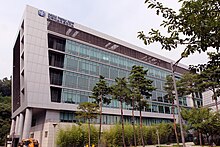
The National Institute of General Medical Sciences (NIGMS) supports basic research that increases understanding of biological processes and lays the foundation for advances in disease diagnosis, treatment, and prevention. NIGMS-funded scientists investigate how living systems work at a range of levels, from molecules and cells to tissues and organs, in research organisms, humans, and populations. Additionally, to ensure the vitality and continued productivity of the research enterprise, NIGMS provides leadership in training the next generation of scientists, in enhancing the diversity of the scientific workforce, and in developing research capacity throughout the country.

The Pasteur Institute is a French non-profit private foundation dedicated to the study of biology, micro-organisms, diseases, and vaccines. It is named after Louis Pasteur, who invented pasteurization and vaccines for anthrax and rabies. The institute was founded on 4 June 1887 and inaugurated on 14 November 1888.

The Miguel Hernández University, is a Spanish Public University offering education, research and services facilitating the comprehensive development of its students. It is located in the province of Alicante and was established in 1996. Its name commemorates the Spanish poet Miguel Hernández.
A biological target is anything within a living organism to which some other entity is directed and/or binds, resulting in a change in its behavior or function. Examples of common classes of biological targets are proteins and nucleic acids. The definition is context-dependent, and can refer to the biological target of a pharmacologically active drug compound, the receptor target of a hormone, or some other target of an external stimulus. Biological targets are most commonly proteins such as enzymes, ion channels, and receptors.

The Korea Institute of Science and Technology is a multi-disciplinary research institute located in Seoul, South Korea. Founded in 1966, it was the first multi-disciplinary scientific research institute in Korea and has contributed significantly to the economic development of the country, particularly during the years of accelerated growth in the 1970s and 1980s. It has a research staff of over 1,800 research scientists, visiting scientists, fellows and trainees, and foreign scientists involved in basic research in various fields of science and technology.
High-content screening (HCS), also known as high-content analysis (HCA) or cellomics, is a method that is used in biological research and drug discovery to identify substances such as small molecules, peptides, or RNAi that alter the phenotype of a cell in a desired manner. Hence high content screening is a type of phenotypic screen conducted in cells involving the analysis of whole cells or components of cells with simultaneous readout of several parameters. HCS is related to high-throughput screening (HTS), in which thousands of compounds are tested in parallel for their activity in one or more biological assays, but involves assays of more complex cellular phenotypes as outputs. Phenotypic changes may include increases or decreases in the production of cellular products such as proteins and/or changes in the morphology of the cell. Hence HCA typically involves automated microscopy and image analysis. Unlike high-content analysis, high-content screening implies a level of throughput which is why the term "screening" differentiates HCS from HCA, which may be high in content but low in throughput.
The Novartis Institute for Tropical Disease (NITD) was a Singapore-based tropical disease research institute created through a public-private partnership between Novartis and the Singapore Economic Development Board. Research at NITD focuses primarily on developing novel small molecule therapies for tropical infectious diseases that are endemic to the developing world, particularly dengue fever, malaria and tuberculosis.

Philippe J. Sansonetti is a French microbiologist, professor at the Pasteur Institute and the Collège de France in Paris. He is the director of the Inserm Unit 786 and of the Institut Pasteur laboratory Pathogénie Microbienne Moléculaire.

André Choulika is a biotechnologist, the inventor of nuclease-based genome editing and a pioneer in the analysis and use of meganucleases to modify complex genomes.
Sir Stewart Thomas Cole is a British/French microbiologist. He was the Director General of the Pasteur Institute since January 2018 to December 2023.
Chetan Eknath Chitnis is an Indian scientist in the field of malaria research. He is the head of the Malaria Parasite Biology and Vaccines Unit at the Institut Pasteur in Paris and an elected fellow of the Indian Academy of Sciences (2009) as well as Indian National Science Academy (2014). He received the Shanti Swaroop Bhatnagar Award in 2004 and the Infosys Prize in Life Sciences 2010. Chitnis is the former principal investigator of the malaria research group at the International Centre for Genetic Engineering and Biotechnology (ICGEB) in New Delhi.

Pangyo Techno Valley (PTV) is an industrial complex in the city of Pangyo, Seongnam, Gyeonggi Province, South Korea. It is also known as the Silicon Valley of Korea. The complex focuses on information technology, biotech, cultural technology and fusion technology. One of the benefits of the diversity of fields and businesses is the maximized growth potential in the field of high-tech technology through exchanges between the companies. The location within a major metropolitan area creates synergy effects because of the proximity to other techno valleys or adjacent knowledge-based infrastructure clusters in the province. The business environment of the PTV is supported by the government of the Gyeonggi Province through the implementation of various support facilities as for examples a R&D center or public support center.

Hee-sup Shin is a South Korean neuroscientist whose work focuses on brain research of genetically engineered mice via gene knockout in order to better understand the human brain. His research resulted in him being named a National Scientist by the Korean Ministry of Science and Technology. He is a former co-director of the Center for Cognition and Sociality leading the Social Neuroscience Group in the Institute for Basic Science (IBS) located at Korea Advanced Institute of Science and Technology (KAIST).
Pasteur Institute of Iran is a medical research center located in Tehran, Iran. The institute is one of the oldest leading research and public health centers in Iran and the Middle East, established in 1920 following an agreement between the Institute Pasteur of Paris and the Iranian government. The Pasteur Institute of Iran was developed with the help of a land donation from Abdol-Hossein Farmanfarma. Its mission is to support advanced research and to provide innovative programs in basic and applied medical sciences, and production of biopharmaceuticals and diagnostic kits with special emphasis on infectious diseases. It meets the specialized and scientific health demands of the local community and tries to establish a link between applied research and industry. Pasteur Institute is a leading regional facility in the development and manufacture of vaccines. The institute has a total staff of 1300 in its 28 departments and 5 branches in different cities of Iran, which are active in different areas of medical and pharmaceutical biotechnology. There are about 300 PhDs and M.Sc. graduates.
Ashok Venkitaraman is a British cancer researcher of Indian origin. He is the Director of the Cancer Science Institute of Singapore, a Distinguished Professor of Medicine at the National University of Singapore, and Program Director at A*STAR, Singapore. From 1998 to 2020, he was the inaugural holder of the Ursula Zoellner Professorship of Cancer Research at the University of Cambridge, a Professorial Fellow at Pembroke College, Cambridge, and from 2006 to 2019, was the Director of the Medical Research Council Cancer Unit.
Open Source Drug Discovery (OSDD) is a Council of Scientific and Industrial Research, India (CSIR)-led Team India Consortium with global participation offering a collaborative drug discovery platform for neglected tropical diseases like leishmaniasis, which draw limited attention of research-based pharmaceutical enterprises. This program has a global community with over 7500 participants from 130 countries comprising researchers, academia, students, industries, educational institutions and so on. Anyone who is committed to the discovery of drugs for neglected diseases in an open source mode can participate in the program. OSDD functions by bringing together experts from diverse backgrounds to focus on discovering and developing affordable drugs for tropical infections.
Tapas Kumar Kundu is an Indian molecular biologist, academician and at present the Director of Central Drug Research Institute, a prestigious research institute of Council of Scientific and Industrial Research at Lucknow. He is the head of the Transcription and Disease Laboratory of Jawaharlal Nehru Centre for Advanced Scientific Research. He is known for his studies on the regulation of Gene expression and his contributions in cancer diagnostics and the development of new drug candidates for cancer and AIDS therapeutics. He is an elected fellow of the Indian Academy of Sciences, Indian National Science Academy and the National Academy of Sciences, India and a J. C. Bose National Fellow of the Department of Science and Technology. The Council of Scientific and Industrial Research, the apex agency of the Government of India for scientific research, awarded him the Shanti Swarup Bhatnagar Prize for Science and Technology, one of the highest Indian science awards, in 2005, for his contributions to biological sciences. He is also a recipient of the National Bioscience Award for Career Development of the Department of Biotechnology.

Nevan J. Krogan is a Canadian molecular and systems biologist. He is a professor and the Director of the Quantitative Biosciences Institute (QBI) at the University of California San Francisco (UCSF), as well as a senior investigator at the J. David Gladstone Institutes.

YoungSoo Kim is a South Korean chemist. Kim is an associate professor in Department of Pharmacy at Yonsei University.
Choong Eui Song is a South Korean organic chemist.










